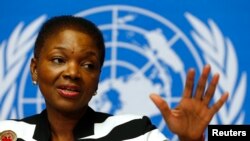The United Nation's humanitarian chief says almost the entire Muslim population of the capital of the Central African Republic has fled after a campaign of violence by largely Christian militias.
U.N. Emergency Relief Coordinator Valerie Amos says about 900 Muslims remain in Bangui. That is less than one percent of the original population of more than 100,000.
Amos said Friday in Geneva that the demography of the CAR is changing. Other cities in the western part of the country have seen a similar exodus of Muslims.
Amos said the U.N. hopes to work with the government to target two to four cities to make sure they retain a mixed population.
"We have to set ourselves some relatively modest tasks to achieve in the short term, just to give people a sense of stability. And I think if we are able, for example, to do that in two, three, four areas of the country where you still have mixed communities, and where you can demonstrate that people can continue to live together, side by side, in a degree of peace and harmony, that that would be a really good message for the Central African Republic right now," said Amos.
Chaos erupted in the CAR last year when mainly Muslim rebels toppled the government. The rebels looted, raped and murdered civilians, giving rise to equally brutal militias made up largely of Christians and animists who have attacked Muslim civilians.
The fighting has killed tens of thousands and left hundreds of thousands homeless and fleeing for their lives.
On Thursday, U.N. High commissioner for Refugees, Antonio Guterres said the world is effectively witnessing a "cleansing" of the majority of the Muslim population in western CAR He said most of the Muslims who remain in the region are under permanent threat.
U.N. Secretary General Ban Ki-moon has said that he is concerned the violence in the CAR could lead to the country being partitioned.
Ban proposes sending a 12,000-member peacekeeping force to the country.
Sixteen-hundred French soldiers already are in the CAR, along with 6,000 African Union troops.
U.N. Emergency Relief Coordinator Valerie Amos says about 900 Muslims remain in Bangui. That is less than one percent of the original population of more than 100,000.
Amos said Friday in Geneva that the demography of the CAR is changing. Other cities in the western part of the country have seen a similar exodus of Muslims.
Amos said the U.N. hopes to work with the government to target two to four cities to make sure they retain a mixed population.
"We have to set ourselves some relatively modest tasks to achieve in the short term, just to give people a sense of stability. And I think if we are able, for example, to do that in two, three, four areas of the country where you still have mixed communities, and where you can demonstrate that people can continue to live together, side by side, in a degree of peace and harmony, that that would be a really good message for the Central African Republic right now," said Amos.
Chaos erupted in the CAR last year when mainly Muslim rebels toppled the government. The rebels looted, raped and murdered civilians, giving rise to equally brutal militias made up largely of Christians and animists who have attacked Muslim civilians.
The fighting has killed tens of thousands and left hundreds of thousands homeless and fleeing for their lives.
On Thursday, U.N. High commissioner for Refugees, Antonio Guterres said the world is effectively witnessing a "cleansing" of the majority of the Muslim population in western CAR He said most of the Muslims who remain in the region are under permanent threat.
U.N. Secretary General Ban Ki-moon has said that he is concerned the violence in the CAR could lead to the country being partitioned.
Ban proposes sending a 12,000-member peacekeeping force to the country.
Sixteen-hundred French soldiers already are in the CAR, along with 6,000 African Union troops.











